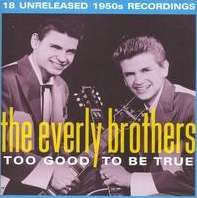Too Good to Be True (album)
| Too Good To Be True | ||||
|---|---|---|---|---|
 | ||||
| Compilation album by The Everly Brothers | ||||
| Released | June 14, 2005 | |||
| Genre | Rock and roll | |||
| Length | 30:51 | |||
| Label | Varese | |||
| Producer | Andrew Sandoval, Cary E. Mansfield | |||
| The Everly Brothers chronology | ||||
| ||||
| Professional ratings | |
|---|---|
| Review scores | |
| Source | Rating |
| Allmusic | |
Too Good To Be True is an album by The Everly Brothers, released in 2005.
Consisting entirely of self-written demonstration recordings recorded between their formative years of 1957 and 1960 (except for the last track, "It's All Over", a solo vocal performance from brother Don in 1976), Too Good To Be True is a bringing together of almost entirely completely unreleased recordings ("Give Me A Future" had already been released in its complete form on the 1992 collection Classic Everly Brothers), the album was the result of a collaboration between Cary Mansfield and Andrew Sandoval, with additional research from Peggy Lamb.
Having originally recorded four songs in November 1955 for Columbia, including a third-take, false-started version of the first song they recorded together, "The Sun Keeps Shining", a cowrite between Don Everly and Jerry Organ (the flip-side of a 45 released in February 1956 on the back of their second-ever recorded song, "Keep A'Lovin' Me"), all of the songs which appear on this album are original recordings. Amongst these songs are original, previously unheard recordings they made when the brothers signed for Acuff-Rose, and demo tracks of latterly released material such as "Should We Tell Him" and the original version of "I Wonder if I Care as Much".
Two of the songs on this compilation had been previously heard, however. When placed alongside other songs on the Bear Family box set, "Life Ain't Worth Living" and "Give Me A Future" jar somewhat as demonstration recordings within otherwise released material, but placed in their original context, and although the latter is a mere seventy-six seconds in length, it is clear proof of their ability as early as 1956, incorporating some of the most accomplished harmony singing and triple-time guitar playing on the album.
As the decade came to a close and official albums such as Songs Our Daddy Taught Us employed tighter harmony singing and the necessity for better-quality playing, the later tracks display a greater sense of rhythm and timing in the original recordings, including The New Album's solo vocal "Dancing On My Feet", present as a previously recorded demo on this album.
Though at times the recording quality of the album is questionable, particularly on "How Did We Stay Together", a track on which the microphone sounds as though it is positioned a long way further back in comparison to its position in relation to the brothers on the rest of the album, since the album contains some of the first new songs released for nearly ten years by the brothers, the album is of major importance to both collectors and fans of the group. In fact, it is arguable that the singing and playing on "Since You Broke My Heart" is in some places of better quality, and better tuning, than in its 1959 release on Everly Brothers' Best.
Track listing
All songs by Don Everly unless otherwise noted.
- "That's Too Good To Be True" – 1:56
- "I Wonder If I Care As Much" – 2:13
- "How Did We Stay Together" – 1:12
- "Maybe Tomorrow" – 1:36
- "I Didn't Mean To Go This Far" – 1:20
- "Should We Tell Him" – 1:45
- "It's Too Late To Say Goodbye" – 1:32
- "Since You Broke My Heart" – 2:09
- "All I Ask Of Life" – 1:38
- "Give Me A Future" – 1:59
- "I'll Throw Myself At You" – 1:21
- "Made To Love" (Phil Everly) – 1:51
- "Life Ain't Worth Living" – 1:16
- "Kiss Me Once" – 1:24
- "Dancing On My Feet" (Phil Everly) – 1:59
- "Do You Love Me" – 1:54
- "When Will I Be Loved?" (Phil Everly) – 1:39
- "It's All Over" – 2:09
- Tracks 12, 15 and 17 are vocal solos from Phil Everly.
- Tracks 14 and 16 are vocal solos from Don Everly.
Personnel
- Don Everly – vocals, guitar
- Phil Everly – vocals, guitar
Production notes
- Dan Hersch – digital remastering
- John Hosum – photo courtesy
- Pete Howard – photography
- Jurgen Koop – cover photo
- Cary E. Mansfield – producer
- Bill Pitzonka – art direction, design
- Andrew Sandoval – producer, liner notes, photo courtesy